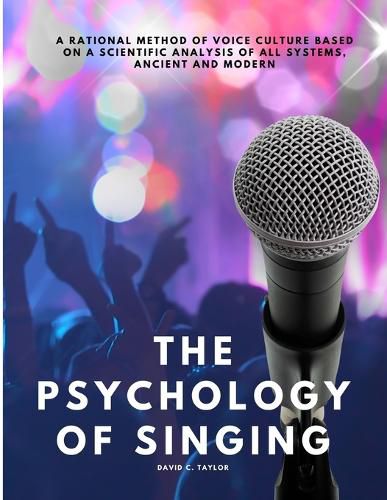Readings Newsletter
Become a Readings Member to make your shopping experience even easier.
Sign in or sign up for free!
You’re not far away from qualifying for FREE standard shipping within Australia
You’ve qualified for FREE standard shipping within Australia
The cart is loading…






This title is printed to order. This book may have been self-published. If so, we cannot guarantee the quality of the content. In the main most books will have gone through the editing process however some may not. We therefore suggest that you be aware of this before ordering this book. If in doubt check either the author or publisher’s details as we are unable to accept any returns unless they are faulty. Please contact us if you have any questions.
A PECULIAR gap exists between the accepted theoretical basis of instruction in singing and the actual methods of vocal teachers. Judging by the number of scientific treatises on the voice, the academic observer would be led to believe that a coherent Science of Voice Culture has been evolved. Modern methods of instruction in singing are presumed to embody a system of exact and infallible rules for the management of the voice. Teachers of singing in all the musical centers of Europe and America claim to follow a definite plan in the training of voices, based on established scientific principles. But a practical acquaintance with the modern art of Voice Culture reveals the fact that the laws of tone-production deduced from the scientific investigation of the voice do not furnish a satisfactory basis for a method of training voices. Throughout the entire vocal profession, among singers, teachers, and students alike, there is a general feeling of the insufficiency of present knowledge of the voice. The problem of the correct management of the vocal organs has not been finally and definitely solved. Voice Culture has not been reduced to an exact science. Vocal teachers are not in possession of an infallible method of training voices. Students of singing find great difficulty in learning how to use their voices. Voice Culture is generally recognized as entitled to a position among the exact sciences; but something remains to be done before it can assume that position.
$9.00 standard shipping within Australia
FREE standard shipping within Australia for orders over $100.00
Express & International shipping calculated at checkout
This title is printed to order. This book may have been self-published. If so, we cannot guarantee the quality of the content. In the main most books will have gone through the editing process however some may not. We therefore suggest that you be aware of this before ordering this book. If in doubt check either the author or publisher’s details as we are unable to accept any returns unless they are faulty. Please contact us if you have any questions.
A PECULIAR gap exists between the accepted theoretical basis of instruction in singing and the actual methods of vocal teachers. Judging by the number of scientific treatises on the voice, the academic observer would be led to believe that a coherent Science of Voice Culture has been evolved. Modern methods of instruction in singing are presumed to embody a system of exact and infallible rules for the management of the voice. Teachers of singing in all the musical centers of Europe and America claim to follow a definite plan in the training of voices, based on established scientific principles. But a practical acquaintance with the modern art of Voice Culture reveals the fact that the laws of tone-production deduced from the scientific investigation of the voice do not furnish a satisfactory basis for a method of training voices. Throughout the entire vocal profession, among singers, teachers, and students alike, there is a general feeling of the insufficiency of present knowledge of the voice. The problem of the correct management of the vocal organs has not been finally and definitely solved. Voice Culture has not been reduced to an exact science. Vocal teachers are not in possession of an infallible method of training voices. Students of singing find great difficulty in learning how to use their voices. Voice Culture is generally recognized as entitled to a position among the exact sciences; but something remains to be done before it can assume that position.